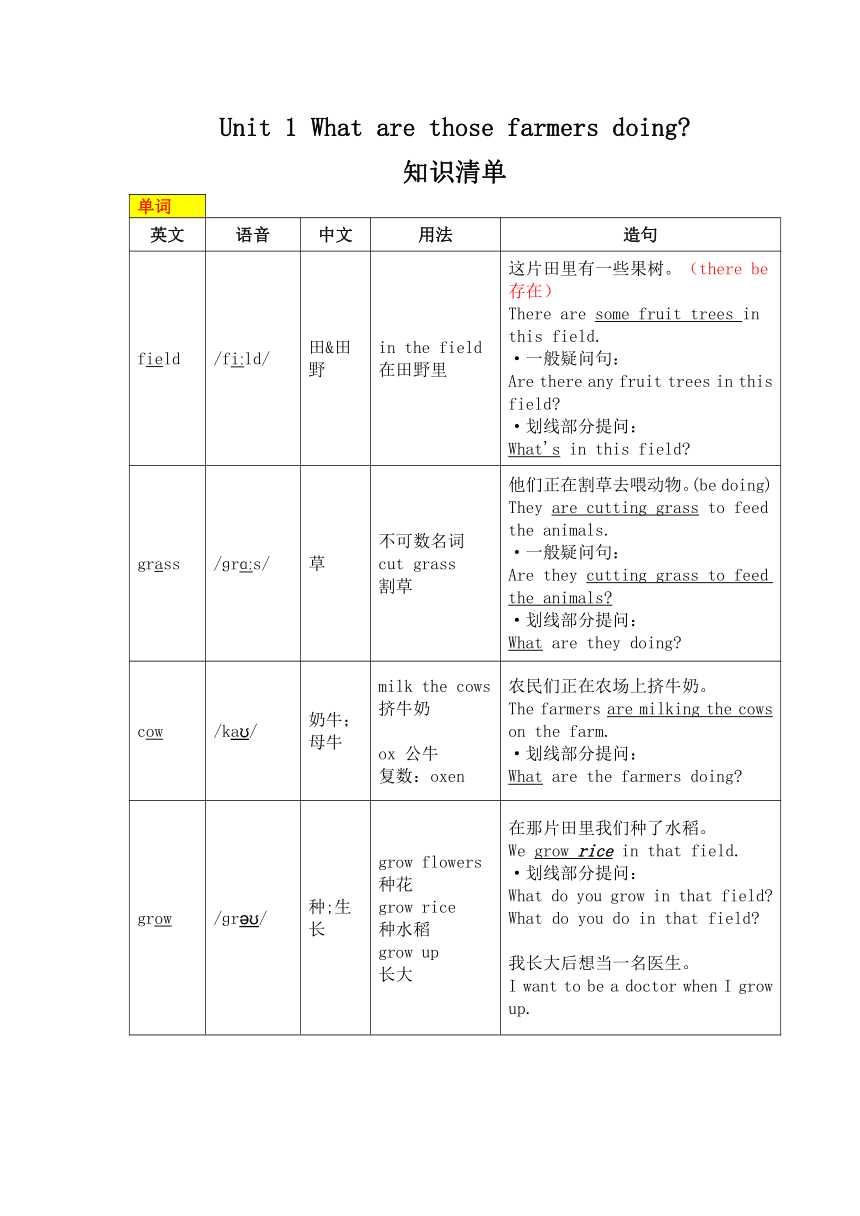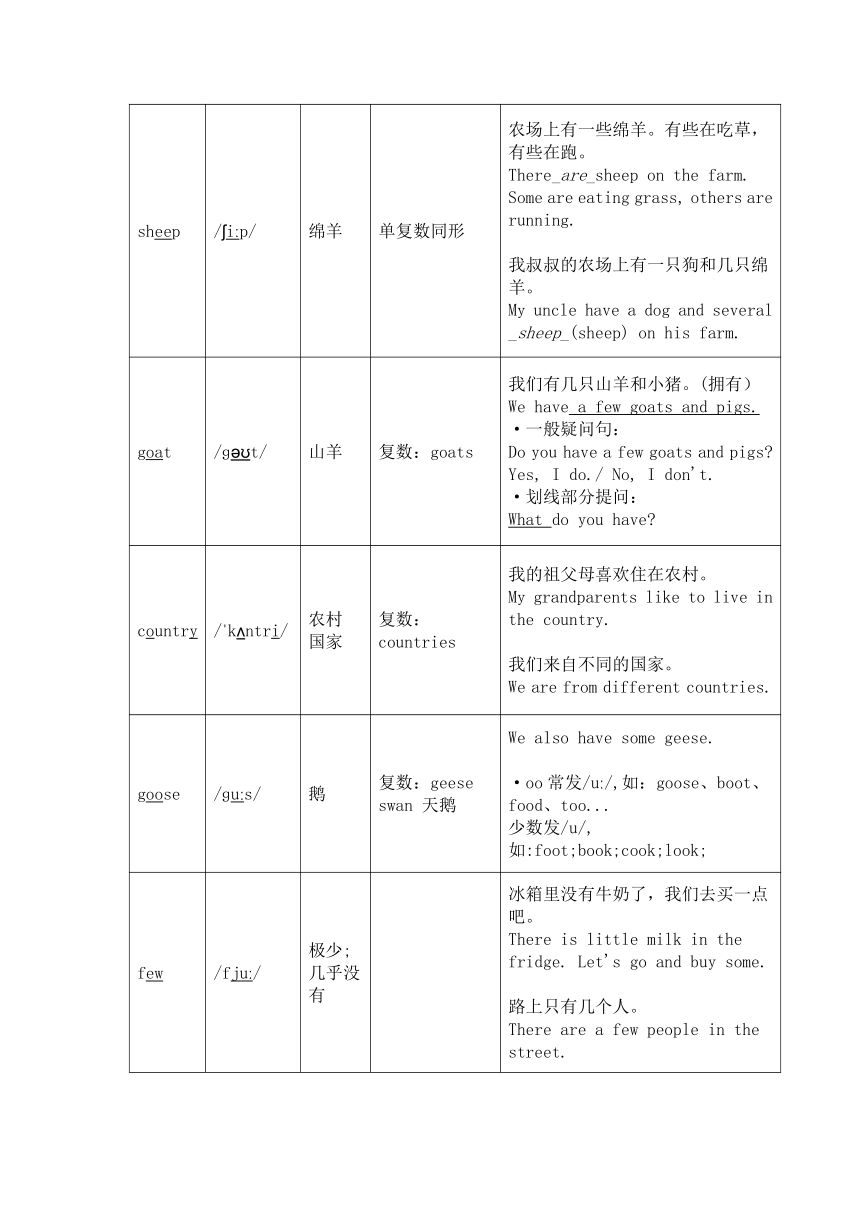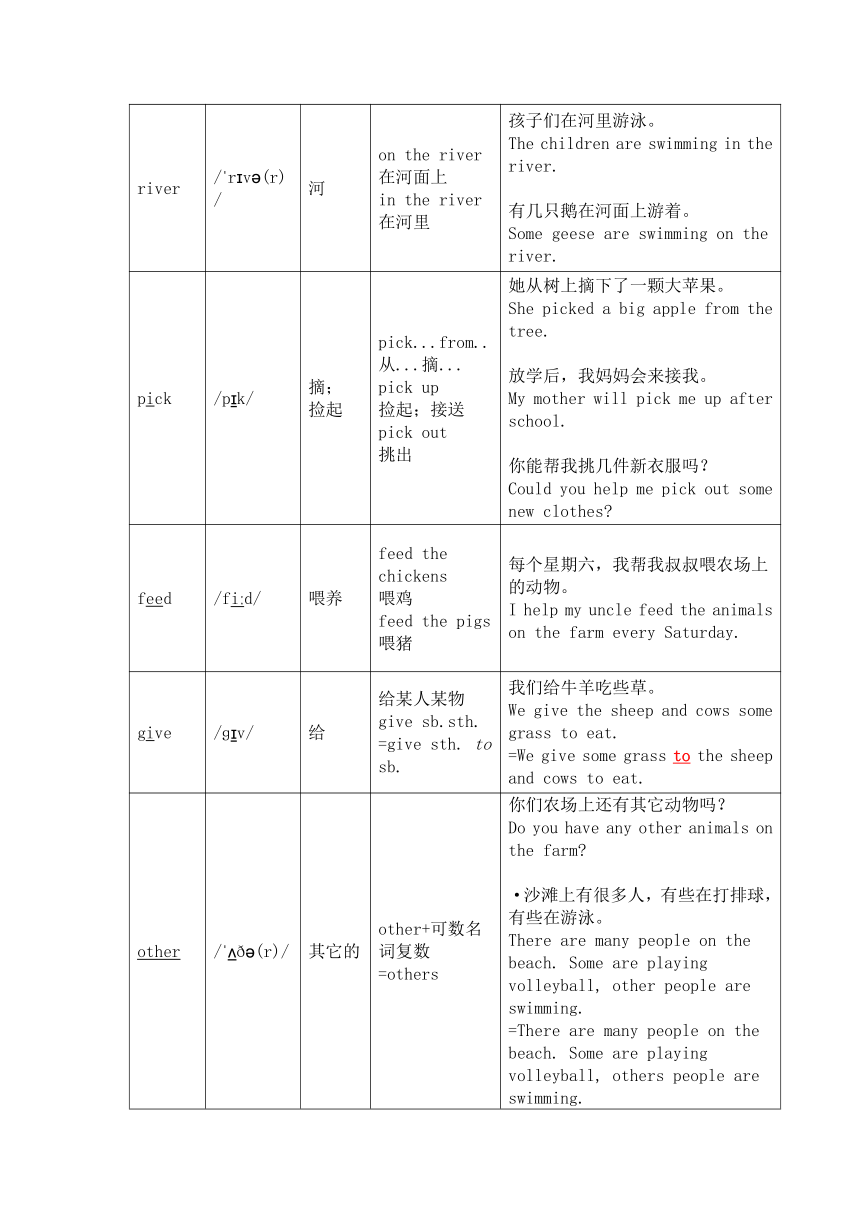Module 1 Unit1 What are those farmers doing 重难点知识清单
文档属性
| 名称 | Module 1 Unit1 What are those farmers doing 重难点知识清单 |

|
|
| 格式 | docx | ||
| 文件大小 | 23.6KB | ||
| 资源类型 | 教案 | ||
| 版本资源 | 教科版(广州) | ||
| 科目 | 英语 | ||
| 更新时间 | 2023-09-13 00:00:00 | ||
图片预览



文档简介
Unit 1 What are those farmers doing
知识清单
单词
英文 语音 中文 用法 造句
field /fi ld/ 田&田野 in the field 在田野里 这片田里有一些果树。(there be存在)
There are some fruit trees in this field.
·一般疑问句:
Are there any fruit trees in this field
·划线部分提问:
What's in this field
grass /ɡrɑ s/ 草 不可数名词
cut grass
割草 他们正在割草去喂动物。(be doing)
They are cutting grass to feed the animals.
·一般疑问句:
Are they cutting grass to feed the animals
·划线部分提问:
What are they doing
cow /ka / 奶牛;
母牛 milk the cows
挤牛奶
ox 公牛
复数:oxen 农民们正在农场上挤牛奶。
The farmers are milking the cows on the farm.
·划线部分提问:
What are the farmers doing
grow /ɡr / 种;生长 grow flowers种花
grow rice
种水稻
grow up
长大 在那片田里我们种了水稻。
We grow rice in that field.
·划线部分提问:
What do you grow in that field
What do you do in that field
我长大后想当一名医生。
I want to be a doctor when I grow up.
sheep / i p/ 绵羊 单复数同形 农场上有一些绵羊。有些在吃草,有些在跑。
There_are_sheep on the farm. Some are eating grass, others are running.
我叔叔的农场上有一只狗和几只绵羊。
My uncle have a dog and several _sheep_(sheep) on his farm.
goat /ɡ t/ 山羊 复数:goats 我们有几只山羊和小猪。(拥有)
We have a few goats and pigs.
·一般疑问句:
Do you have a few goats and pigs
Yes, I do./ No, I don't.
·划线部分提问:
What do you have
country / k ntri/ 农村
国家 复数:countries 我的祖父母喜欢住在农村。
My grandparents like to live in the country.
我们来自不同的国家。
We are from different countries.
goose /ɡu s/ 鹅 复数:geese
swan 天鹅 We also have some geese.
·oo常发/u /,如:goose、boot、food、too...
少数发/u/,如:foot;book;cook;look;
few /fju / 极少;
几乎没有 冰箱里没有牛奶了,我们去买一点吧。
There is little milk in the fridge. Let's go and buy some.
路上只有几个人。
There are a few people in the street.
river / r v (r)/ 河 on the river
在河面上
in the river
在河里 孩子们在河里游泳。
The children are swimming in the river.
有几只鹅在河面上游着。
Some geese are swimming on the river.
pick /p k/ 摘;
捡起 pick...from..
从...摘...
pick up
捡起;接送
pick out
挑出 她从树上摘下了一颗大苹果。
She picked a big apple from the tree.
放学后,我妈妈会来接我。
My mother will pick me up after school.
你能帮我挑几件新衣服吗?
Could you help me pick out some new clothes
feed /fi d/ 喂养 feed the chickens
喂鸡
feed the pigs
喂猪 每个星期六,我帮我叔叔喂农场上的动物。
I help my uncle feed the animals on the farm every Saturday.
give /ɡ v/ 给 给某人某物
give sb.sth.
=give sth. to sb. 我们给牛羊吃些草。
We give the sheep and cows some grass to eat.
=We give some grass to the sheep and cows to eat.
other / (r)/ 其它的 other+可数名词复数
=others 你们农场上还有其它动物吗?
Do you have any other animals on the farm
·沙滩上有很多人,有些在打排球,有些在游泳。
There are many people on the beach. Some are playing volleyball, other people are swimming.
=There are many people on the beach. Some are playing volleyball, others people are swimming.
短语
很多东西 many things 地上有很多东西。
There are many things on the floor.
种树 plant trees 我们每年3月12日都会种一棵树。
We plant a tree on March 12th every year.
种水稻 grow rice 我们在田里种了很多水稻。
We grow a lot of rice in the field.
种花和蔬菜 grow flowers and vegetables 我的奶奶在院子里种了很多花和蔬菜。
My grandma grows many flowers and vegetables in the yard.
看起来很可爱 look lovely 这只小狗看起来好可爱。
The dog looks lovely.
句式:
there be句型
表存在 表示某地有某物,存在状态,用there be 句型。主语是be动词后面的名词或名词短语,谓语动词的数跟主语保持一致。 There is little milk in the fridge.
There are two cows and a sheep on the farm.
=There is a sheep and two cows on the farm.
have表拥有
=have got 口语中常用have got,与have意思相同,但有实义动词与助动词的区别。 I have a computer.
否定句:
I don't have a computer.
一般疑问句:
Do you have a computers
Yes, I do./ No, I don't.
=I have got a computer.
否定句:
I haven't got a computer.
一般疑问句:
Have you got a computers
Yes, I have./No, I haven't.
if条件句 作状语,对主干信息的条件进行补充说明。可放在句首,与主句用逗号隔开,也可直接跟在主句后面。 如果你想的话,你可以在书上摘些苹果和橙子。
If you want, (状语从句)you can pick apples and oranges from the trees.
=You can pick apples and oranges from the trees if you want(状语从句).
give sb.sth.
=give sth. to sb. 五大句型之“主谓宾宾”:
·同一个动作,有两个承受者,通常一个是人,一个是事物。分为直接宾语和简接宾语。
·直宾(物)和间宾(人)的语序可调整,即:给某人某物=把某物给某人,但间宾在后时,需加上介词。 请把书给我。
Please give me the book.
=Please give the book to me.
拓:
给某人买某物:
buy sb. sth.=buy sth. for sb.
我昨天在商店给我妈妈买了一个礼物。
I bought my mom a gift in the shop yesterday.
=I bought a gift for my mom in the shop yesterday.
语法:
be doing现在进行时 ·表示动作正在进行与持续中(......),注意不要漏写be动词。
·标志词:now\at the moment\look\listen...
·特殊用:现进表将来come\go\leave等位移动词,突出紧迫感。 The children are swimming in the pool now.
·否定句:The children aren't swimming in the pool now.
·一般疑问句:
Are the children swimming in the pool now.
Yes, they are./ No, they aren't.
·划线部分提问:
What are the children doing in the pool now
我明天会去北京。
I'm going to Beijing tomorrow.
公车来了。
The bus is coming.
some与any ·some 用于肯定句或者部分期待肯定回答的疑问句;
·any用于否定句及疑问句。 I have some friends in Beijing.
否:I don't have any friends in Beijing.
疑问:Do you have any friends in Beijing?
(邀请、请求疑问句)
Would you like to have some hamburger
Can you give me some money
many与much many+可数名词复数
much+不可数名词 我有很多事情要做。
I have many things to do.
我有很多作业要做。
I have much homework to do.
few与little ·few+可数名词复数
little+不可数名词
·几乎没有:
few/little
有一点:
a few/a little 操场上有几个学生。 There is a few students in the playground. 操场上没几个学生。
There is few students in the playground.
杯子里有一点水。
There is a little water in the bottle. 杯子里没多少水了。
There is little water in the bottle.
other与another ·another 另一个,泛指
the other 另一个,特指
·other 与 the other的区别在于是否一分为二。 ·这本书很无聊,你可以给我拿另一本吗?(无特指哪一本书)
This book is boring. Can you give me another one
·沙滩上有很多人,有些在打排球,有些在游泳。(除了打排球和游泳的,还有别的)
There are many people on the beach. Some are playing volleyball, others are swimming.
·我们班有50个人.23个是女生,其他的是男生。(除了女生就是男生,一分为二)
There are 50 students in our class. 23 are girls, and the others are boys.
名词作定语 当名词充当定语时,此时是形容词性质,失去原本的名词性质,不用变复数。 果树:fruit trees
苹果树:apple trees
故事书:story books
石头桥:a stone bridge
知识清单
单词
英文 语音 中文 用法 造句
field /fi ld/ 田&田野 in the field 在田野里 这片田里有一些果树。(there be存在)
There are some fruit trees in this field.
·一般疑问句:
Are there any fruit trees in this field
·划线部分提问:
What's in this field
grass /ɡrɑ s/ 草 不可数名词
cut grass
割草 他们正在割草去喂动物。(be doing)
They are cutting grass to feed the animals.
·一般疑问句:
Are they cutting grass to feed the animals
·划线部分提问:
What are they doing
cow /ka / 奶牛;
母牛 milk the cows
挤牛奶
ox 公牛
复数:oxen 农民们正在农场上挤牛奶。
The farmers are milking the cows on the farm.
·划线部分提问:
What are the farmers doing
grow /ɡr / 种;生长 grow flowers种花
grow rice
种水稻
grow up
长大 在那片田里我们种了水稻。
We grow rice in that field.
·划线部分提问:
What do you grow in that field
What do you do in that field
我长大后想当一名医生。
I want to be a doctor when I grow up.
sheep / i p/ 绵羊 单复数同形 农场上有一些绵羊。有些在吃草,有些在跑。
There_are_sheep on the farm. Some are eating grass, others are running.
我叔叔的农场上有一只狗和几只绵羊。
My uncle have a dog and several _sheep_(sheep) on his farm.
goat /ɡ t/ 山羊 复数:goats 我们有几只山羊和小猪。(拥有)
We have a few goats and pigs.
·一般疑问句:
Do you have a few goats and pigs
Yes, I do./ No, I don't.
·划线部分提问:
What do you have
country / k ntri/ 农村
国家 复数:countries 我的祖父母喜欢住在农村。
My grandparents like to live in the country.
我们来自不同的国家。
We are from different countries.
goose /ɡu s/ 鹅 复数:geese
swan 天鹅 We also have some geese.
·oo常发/u /,如:goose、boot、food、too...
少数发/u/,如:foot;book;cook;look;
few /fju / 极少;
几乎没有 冰箱里没有牛奶了,我们去买一点吧。
There is little milk in the fridge. Let's go and buy some.
路上只有几个人。
There are a few people in the street.
river / r v (r)/ 河 on the river
在河面上
in the river
在河里 孩子们在河里游泳。
The children are swimming in the river.
有几只鹅在河面上游着。
Some geese are swimming on the river.
pick /p k/ 摘;
捡起 pick...from..
从...摘...
pick up
捡起;接送
pick out
挑出 她从树上摘下了一颗大苹果。
She picked a big apple from the tree.
放学后,我妈妈会来接我。
My mother will pick me up after school.
你能帮我挑几件新衣服吗?
Could you help me pick out some new clothes
feed /fi d/ 喂养 feed the chickens
喂鸡
feed the pigs
喂猪 每个星期六,我帮我叔叔喂农场上的动物。
I help my uncle feed the animals on the farm every Saturday.
give /ɡ v/ 给 给某人某物
give sb.sth.
=give sth. to sb. 我们给牛羊吃些草。
We give the sheep and cows some grass to eat.
=We give some grass to the sheep and cows to eat.
other / (r)/ 其它的 other+可数名词复数
=others 你们农场上还有其它动物吗?
Do you have any other animals on the farm
·沙滩上有很多人,有些在打排球,有些在游泳。
There are many people on the beach. Some are playing volleyball, other people are swimming.
=There are many people on the beach. Some are playing volleyball, others people are swimming.
短语
很多东西 many things 地上有很多东西。
There are many things on the floor.
种树 plant trees 我们每年3月12日都会种一棵树。
We plant a tree on March 12th every year.
种水稻 grow rice 我们在田里种了很多水稻。
We grow a lot of rice in the field.
种花和蔬菜 grow flowers and vegetables 我的奶奶在院子里种了很多花和蔬菜。
My grandma grows many flowers and vegetables in the yard.
看起来很可爱 look lovely 这只小狗看起来好可爱。
The dog looks lovely.
句式:
there be句型
表存在 表示某地有某物,存在状态,用there be 句型。主语是be动词后面的名词或名词短语,谓语动词的数跟主语保持一致。 There is little milk in the fridge.
There are two cows and a sheep on the farm.
=There is a sheep and two cows on the farm.
have表拥有
=have got 口语中常用have got,与have意思相同,但有实义动词与助动词的区别。 I have a computer.
否定句:
I don't have a computer.
一般疑问句:
Do you have a computers
Yes, I do./ No, I don't.
=I have got a computer.
否定句:
I haven't got a computer.
一般疑问句:
Have you got a computers
Yes, I have./No, I haven't.
if条件句 作状语,对主干信息的条件进行补充说明。可放在句首,与主句用逗号隔开,也可直接跟在主句后面。 如果你想的话,你可以在书上摘些苹果和橙子。
If you want, (状语从句)you can pick apples and oranges from the trees.
=You can pick apples and oranges from the trees if you want(状语从句).
give sb.sth.
=give sth. to sb. 五大句型之“主谓宾宾”:
·同一个动作,有两个承受者,通常一个是人,一个是事物。分为直接宾语和简接宾语。
·直宾(物)和间宾(人)的语序可调整,即:给某人某物=把某物给某人,但间宾在后时,需加上介词。 请把书给我。
Please give me the book.
=Please give the book to me.
拓:
给某人买某物:
buy sb. sth.=buy sth. for sb.
我昨天在商店给我妈妈买了一个礼物。
I bought my mom a gift in the shop yesterday.
=I bought a gift for my mom in the shop yesterday.
语法:
be doing现在进行时 ·表示动作正在进行与持续中(......),注意不要漏写be动词。
·标志词:now\at the moment\look\listen...
·特殊用:现进表将来come\go\leave等位移动词,突出紧迫感。 The children are swimming in the pool now.
·否定句:The children aren't swimming in the pool now.
·一般疑问句:
Are the children swimming in the pool now.
Yes, they are./ No, they aren't.
·划线部分提问:
What are the children doing in the pool now
我明天会去北京。
I'm going to Beijing tomorrow.
公车来了。
The bus is coming.
some与any ·some 用于肯定句或者部分期待肯定回答的疑问句;
·any用于否定句及疑问句。 I have some friends in Beijing.
否:I don't have any friends in Beijing.
疑问:Do you have any friends in Beijing?
(邀请、请求疑问句)
Would you like to have some hamburger
Can you give me some money
many与much many+可数名词复数
much+不可数名词 我有很多事情要做。
I have many things to do.
我有很多作业要做。
I have much homework to do.
few与little ·few+可数名词复数
little+不可数名词
·几乎没有:
few/little
有一点:
a few/a little 操场上有几个学生。 There is a few students in the playground. 操场上没几个学生。
There is few students in the playground.
杯子里有一点水。
There is a little water in the bottle. 杯子里没多少水了。
There is little water in the bottle.
other与another ·another 另一个,泛指
the other 另一个,特指
·other 与 the other的区别在于是否一分为二。 ·这本书很无聊,你可以给我拿另一本吗?(无特指哪一本书)
This book is boring. Can you give me another one
·沙滩上有很多人,有些在打排球,有些在游泳。(除了打排球和游泳的,还有别的)
There are many people on the beach. Some are playing volleyball, others are swimming.
·我们班有50个人.23个是女生,其他的是男生。(除了女生就是男生,一分为二)
There are 50 students in our class. 23 are girls, and the others are boys.
名词作定语 当名词充当定语时,此时是形容词性质,失去原本的名词性质,不用变复数。 果树:fruit trees
苹果树:apple trees
故事书:story books
石头桥:a stone bridge
同课章节目录
- Module 1 Country life
- Unit 1 What are those farmers doing?
- Unit 2 A country life is a healthy life
- Module 2 City life
- Unit 3 Where are you from?
- Unit 4 I like the city very much
- Module 3 Health
- Unit 5 What's the matter with you?
- Unit 6 The secret of good health
- Module 4 Past experiences
- Unit 7 What did you do yesterday?
- Unit 8 A trip to Hong Kong
- Module 5 Changes
- Unit 9 Was I a good girl back then?
- Unit 10 Then and now
- Module 6 Festivals
- Unit 11 I like the Spring Festival best
- Unit 12 Other festival in China
- Unit 12 Christmas(旧版)
- Module 7 Let's look back
